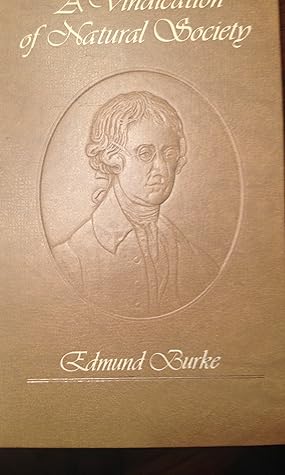- Bíblia
- Leia a Bíblia
- Versões da Bíblia
- Verso do dia
- Planos de Leitura
- Versos por Tópico
- Books of the Bible
- Imagens bíblicas
- Estude
- Comentários
- Concordâncias
- Dicionários
- Enciclopédias
- Sermões
- Bible Atlas & Maps
- BP Wiki
- Devocionais
- Devocionais de hoje
- Light of the World
- Todos os devocionais
- Inspirational Quotes
- Mais
- Picture Quotes
- Videos
- Inspirador
- Estudo da Bíblia
- O que a Bíblia diz
- Bible Q&As
- Daily Bread
- Bible by Genre
- Bible Stories
- Random Bible Verse
- Comunidade
- Store
A Vindication of Natural Society
by Edmund Burke
Edmund Burke (1729-1797) was an Anglo-Irish statesman, author, orator, political theorist, and philosopher who, after relocating to Great Britain, served for many years in the British House of Commons as a member of the Whig party. He is mainly remembered for his support of the American colonies in the dispute with King George III and Britain that led to the American Revolution and for his strong opposition to the French Revolution. Burke worked on aesthetics and founded the Annual Register, a political review. He is widely regarded as the philosophical founder of Anglo-American conservatism. Burkea€(TM)s first published work, A Vindication of Natural Society, appeared in 1756. In 1757, he published a treatise on aesthetics, A Philosophical Enquiry into the Origin of Our Ideas of the Sublime and Beautiful. His other works include: Reflections on the Revolution in France (1790) and An Appeal from the New to the Old Whigs (1791).
BUY NOW
Paperback, 48 pages
Published November 21st 2008 by Dodo Press (first published 1756)
Se inscrever
© 2025 Bibleportal.com Todos os direitos reservados.

Edmund Burke, was born in Dublin, January 12, educated at a Quaker boarding school and at Trinity College, Dublin. In 1750 he entered the Middle Temple, London, but soon abandoned law for literary work.
The best of Burke's writings and speeches belong to this period, and may be described as a defense of sound constitutional statesmanship against prevailing abuse and misgovernment. In 1788 he opened the trial of Warren Hastings by the speech which will always rank among the masterpieces of English eloquence.
Burke had vast knowledge of political affairs, a glowing imagination, passionate sympathies, and an inexhaustible wealth of powerful and cultured expression. However, his delivery was awkward and speeches which today captivate the reader only served to empty the benches of the House of Commons (some speeches were in excess of eight hours).
One of the foremost political thinkers of 18th century England, Burke died July 9, 1797, and was buried in a little church at Beaconsfield.
... Show more